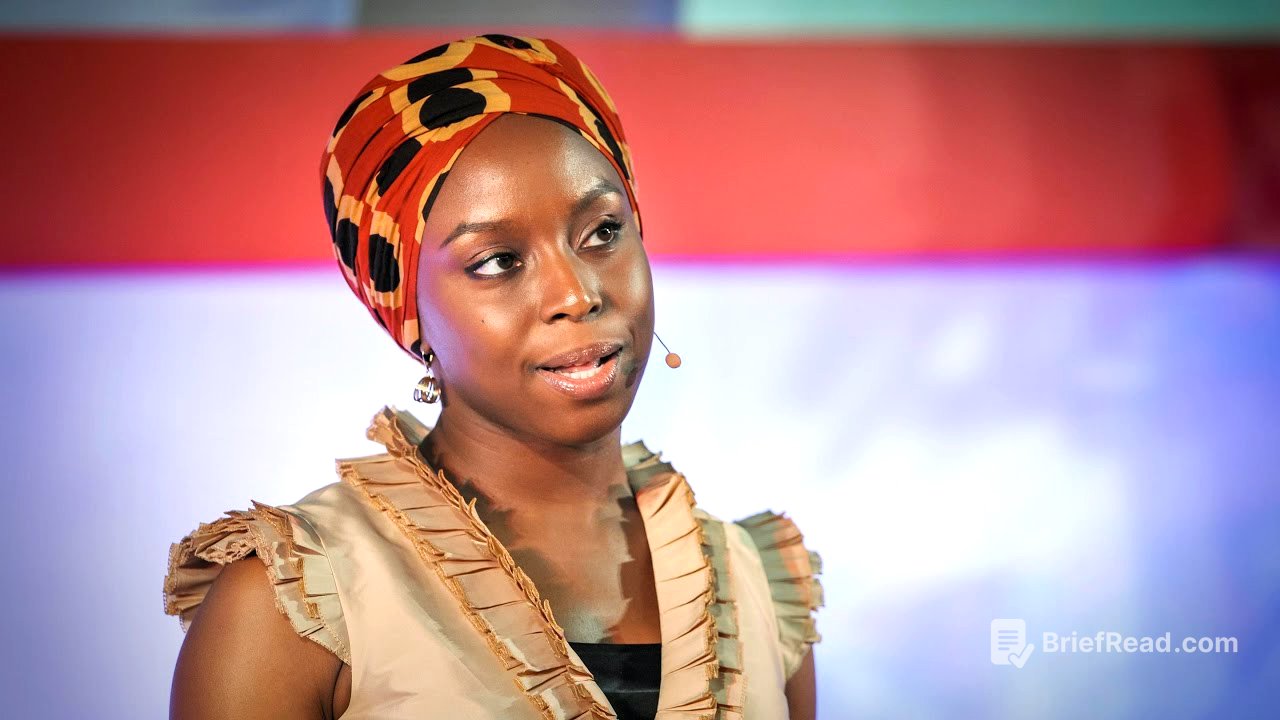TLDR;
Chimamanda Ngozi Adichie discusses the danger of single stories, illustrating how they can lead to misunderstandings, stereotypes, and a lack of recognition of our shared humanity. She shares personal anecdotes about her childhood in Nigeria, her experiences in the United States, and her travels in Mexico to highlight how single stories are created, perpetuated, and the power dynamics that underlie them. Adichie emphasizes the importance of embracing multiple narratives to foster empathy, understanding, and a more complete picture of individuals, cultures, and nations.
- Single stories create stereotypes by presenting a group of people as one thing, over and over again.
- Power determines whose stories are told, how they are told, and how many stories are told.
- Rejecting the single story and embracing multiple narratives can lead to a regained sense of paradise and understanding.
Early Reading and Writing [0:12]
Adichie recounts her early childhood in Nigeria, where she grew up reading British and American children's books. As an early writer, she created stories with white, blue-eyed characters who played in the snow and talked about the weather, despite living in Nigeria where there was no snow and the weather was not a common topic. Her characters also drank ginger beer, even though she had no idea what it was. This experience demonstrates how impressionable and vulnerable children are to stories, leading her to believe that books had to feature foreigners and things she couldn't personally identify with.
Discovering African Literature [2:07]
The author describes a turning point when she discovered African books by writers like Chinua Achebe and Camara Laye. This discovery led to a mental shift, as she realized that people like her, girls with dark skin and kinky hair, could also exist in literature. She began to write about things she recognized, which saved her from having a single story of what books are. While she loved the American and British books that stirred her imagination and opened up new worlds, she realized that they unintentionally made her believe that people like her could not exist in literature.
The House Boy Fide [2:59]
Adichie shares a story about Fide, a house boy from a poor rural village who worked for her family. Her mother always emphasized Fide's family's poverty, which led Adichie to feel pity for them. However, when she visited Fide's village, she was surprised to see a beautifully patterned basket made by his brother. This experience made her realize that all she had heard about Fide's family was their poverty, which had become her single story of them, preventing her from seeing them as anything else.
Encountering Stereotypes in America [4:13]
The author discusses her experience going to university in the United States and encountering her American roommate's preconceived notions about Africa. Her roommate was shocked by her good English, asked to listen to her "tribal music," and assumed she didn't know how to use a stove. Adichie realized that her roommate had a single story of Africa as a place of catastrophe, with no possibility of Africans being similar to her or having complex feelings. This led Adichie to consciously identify as African, although she found it irritating when Africa was referred to as a single country.
The Single Story of Africa [5:56]
Adichie reflects on how, if she hadn't grown up in Nigeria and only knew Africa from popular images, she too would think of it as a place of beautiful landscapes, animals, and incomprehensible people fighting senseless wars, dying of poverty and AIDS, and waiting to be saved by a kind, white foreigner. She connects this single story of Africa to Western literature, citing a quote from a 16th-century London merchant who described Africans as "beasts who have no houses" and "people without heads." This tradition of portraying Africa negatively has influenced perceptions and led to the idea that her novel was not "authentically African" because her characters were educated, middle-class, and drove cars.
Guilt of the Single Story [8:21]
The author admits her own guilt in perpetuating single stories, recounting a trip to Mexico from the U.S. during a time of tense political debates about immigration. Immersed in media coverage of Mexicans as people who were fleecing the healthcare system and sneaking across the border, she felt surprised and then ashamed when she saw ordinary people in Guadalajara going to work and laughing. She realized she had bought into the single story of Mexicans as abject immigrants.
Power of Stories [9:37]
Adichie introduces the Igbo word "nkali," which means "to be greater than another," to explain how power structures define stories. She asserts that how stories are told, who tells them, when they're told, and how many stories are told all depend on power. Power is the ability to make one story the definitive story of another person. She uses the example of starting the story of Native Americans with their arrows instead of the arrival of the British, or starting the story of Africa with the failure of the African state instead of its colonial creation, to illustrate how different stories can be created depending on the starting point.
Rejecting the Single Story [11:55]
The author shares personal anecdotes to illustrate the complexity of her own identity and experiences. She had a happy childhood but also experienced loss and political fear. She emphasizes that insisting on only negative stories flattens her experience and overlooks the many other stories that formed her. Single stories create stereotypes, which are incomplete and make one story become the only story. While Africa has catastrophes, it also has other stories that are important to tell.
Consequences and Solutions [13:54]
Adichie argues that the single story robs people of dignity, makes it difficult to recognize our equal humanity, and emphasizes differences over similarities. She suggests considering multiple perspectives, such as following the immigration debate from both the U.S. and Mexican sides, or acknowledging Fide's family as both poor and hardworking. She dreams of an African television network that broadcasts diverse African stories and highlights the importance of a balance of stories. She shares examples of her Nigerian publisher, a fearless TV host, medical advancements, contemporary music, a female lawyer challenging discriminatory laws, and the Nollywood film industry to illustrate the diverse and complex realities of Nigeria.
The Importance of Many Stories [17:36]
The author concludes by emphasizing that stories matter and that many stories matter. Stories can be used to dispossess and malign, but they can also empower and humanize. She shares a quote from Alice Walker about Southern relatives who regained a sense of paradise by reading a book about their Southern life. Adichie ends by stating that when we reject the single story and realize that there is never a single story about any place, we regain a kind of paradise.









